Are Noah’s sons Shem, Ham and Japheth the founders of nations?

Question: The title the NIV gives Genesis 10 is “The Table of Nations.” Are the descendants of Noah’s sons Shem, Ham and Japheth the founders of nations? Names for some of the descendants are Egypt, Canaan, Aram, Havilah and Sheba. Many people have heard of these place names, i.e. the queen of Sheba. So did the sons of Noah bring about these nations?
Answer: These sons arrived too late on the scene to be the originators of some of the names they represent. The first dynasty of Egypt goes back before 3000 BC.
In the ancient near and middle east new settlers in an area may have taken on the name of that area to show a willingness to integrate and work towards a common objective that makes civil life possible. There are some examples of this:
- Hamor the Hivite lived in the city of Shechem, he named his son Shechem too (Gen 34:2).
- Abram went to live near the great trees of Mamre at Hebron (Gen 18:13). In Genesis 14 when Abram rescues Lot, we find that three brothers helped him: Aner, Eshkol and Mamre.
- Abraham's brother Nahor had a grandson called "Aram". Nahor was already living in the area of Aram Naharaim. (Gen 24:10).
- Jephthah lived in Gilead, he became a mighty warrior. His father's name was "Gilead" (Judg 11:1). And we know from back in the book of Genesis that Gilead already existed long before Jephthah's family lived there.
Furthermore we see in Genesis 10 that Sheba was the name of two sons, one who was a descendant of Shem (Gen 10:28), and one who was a descendent of Ham (Gen 10:7).
We see a similar scenario with Havilah in Genesis 10 too. The river Pishon mentioned in Genesis 2:11 winds through the land of Havilah. Ham had a son called Havilah (Gen 10:7) and Shem also had a descendent called Havilah (Gen 10:29).
So we are left to conclude that the sons took their names from pre-existing place-names. Although some may have been leaders of clans and people groupings such as Kasluhites, because the text states “from whom the Philistines came” (Gen 10:14). But we don't read regarding Egypt (or Mizraim as the KJV calls him) "from whom the Egyptians came".
We see that the edict God gave Noah and his sons was to replenish, spread out, fill the earth. "Then God blessed Noah and his sons, saying to them, 'Be fruitful and increase in number and fill the earth'" (Gen 9:1). A part of the "filling" was to move away to other regions. So giving their sons names that correspond with the regions that they settled in seems to be what happened.
The descendants of Noah and his three sons were scattered across vast reaches. "These were the three sons of Noah, and from them came the people who were scattered over the whole earth" (Gen 9:19). The emphasis on "scattered". Other people groups who were already in place were not "scattered" as they were already settled.
The Septuagint puts it this way, "These three are the sons of Noe, (Noah) of these were men scattered over all the earth." (Gen 9:19).
The Hebrew word "scattered" is naphats which means "shattered" as in a jar that breaks up and scatters in pieces. Some translations use the word "populated," or "overspread," but "scattered" seems to be the closest in meaning.
"The Table of Nations" isn’t a phrase we read in the Bible rather we read, “Generations of Shem, Ham, Japheth” (Gen 10:1). Genesis is structured by uses of the word toledoth, “generations.”